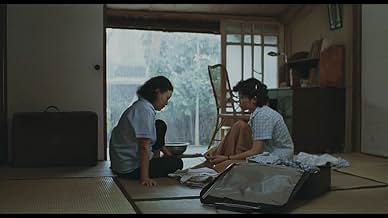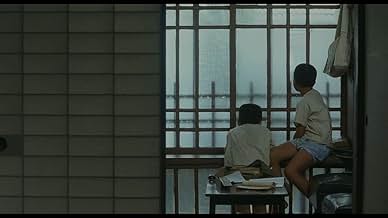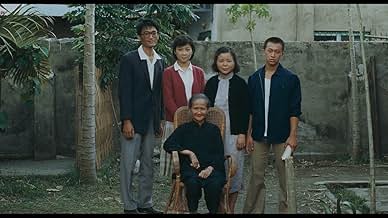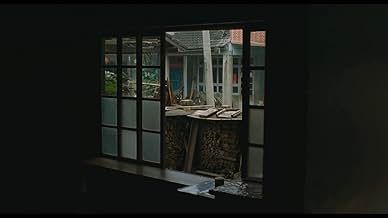NOTE IMDb
7,5/10
3,8 k
MA NOTE
Film semi-autobiographique sur l'enfance et l'adolescence du réalisateur Hou Hsiao-Hsien, quand il grandissait à Taïwan, traversant le deuil de son père, sa mère et sa grand-mère.Film semi-autobiographique sur l'enfance et l'adolescence du réalisateur Hou Hsiao-Hsien, quand il grandissait à Taïwan, traversant le deuil de son père, sa mère et sa grand-mère.Film semi-autobiographique sur l'enfance et l'adolescence du réalisateur Hou Hsiao-Hsien, quand il grandissait à Taïwan, traversant le deuil de son père, sa mère et sa grand-mère.
- Réalisation
- Scénario
- Casting principal
- Récompenses
- 8 victoires et 5 nominations au total
Avis à la une
"A Time to Live and a Time to Die" reads like a family saga, but it is just as much a film about the passing of traditional China and the dislocation of exile. Of course the plot points are given away; Hou isn't interested in dramatic tension and Aristotelian unities--these are so dependent on Western ideas of
personality and the separation of individual and world that they make little
sense in China. He doesn't push the events in our faces, either--they just
happen, often in the middle distance with a tree in the foreground, the way real life happens. (Remember Auden's "Musee de Beaux Arts", with Icarus plunging
in the sea far off while a ploughman works on his field?)
The space Hou gives his events and his characters doesn't give us the intimacy with people that we expect in the West. But it gives us a rich sense of the
texture of life and the things that pass among members of a family and a
community, even one that is thrown together and can just as suddenly fall
apart, as it begins to here. It's that feeling for social space, in part, that allows this film and others of his to address social and historical questions without ever losing the sharp particularity of a personal story.
personality and the separation of individual and world that they make little
sense in China. He doesn't push the events in our faces, either--they just
happen, often in the middle distance with a tree in the foreground, the way real life happens. (Remember Auden's "Musee de Beaux Arts", with Icarus plunging
in the sea far off while a ploughman works on his field?)
The space Hou gives his events and his characters doesn't give us the intimacy with people that we expect in the West. But it gives us a rich sense of the
texture of life and the things that pass among members of a family and a
community, even one that is thrown together and can just as suddenly fall
apart, as it begins to here. It's that feeling for social space, in part, that allows this film and others of his to address social and historical questions without ever losing the sharp particularity of a personal story.
The Taiwanese movie Tong nien wang shi was shown in the U.S. with the title A Time to Live, a Time to Die (1985). The movie was co-written and directed by Hsiao-hsien Hou, and is said to be semi-autobiographical.
The film is a coming of age story of Ah-Ha, whom we meet as a boy of about seven, and whose life we follow until his late teen years. Ah-Ha's family fled China in 1947, and now live in Taiwan. At first, there was still talk about recapturing the mainland, although those discussions faded away as the reality became clear. Still, Ah-Ha's grandmother is convinced that she can walk back to the mainland, and frequently asks people to help her to get there.
If the movie does, indeed, contain autobiographical elements, Hsiao-hsien Hou had a difficult boyhood. His family was poor, and Illness stalked them. As a teenager, Ah-Ha joins a gang that is extraordinarily violent. (The violence takes place off screen, but it is an ever-present plot element in the second half of the film.)
The plot doesn't give us too many heart-rending moments, but it's still very grim. In fact, as I thought back about it, there was only one truly positive scene when—to Ah-Ha's astonishment--his grandmother is able to juggle three guavas. Imagine a movie that is more than two hours long, and has only about 30 seconds of true happiness in it.
It's hard to recommend a movie like this, but, on the positive side, the camera work is brilliant, the acting is excellent, and the film gives us a glimpse of what life was like for a Chinese subculture—people from the mainland who migrated to Taiwan.
We saw this movie at the excellent Dryden Theatre at Eastman House in Rochester, NY as part of a Hsiao-hsien Hou retrospective. It will work well on DVD.
The film is a coming of age story of Ah-Ha, whom we meet as a boy of about seven, and whose life we follow until his late teen years. Ah-Ha's family fled China in 1947, and now live in Taiwan. At first, there was still talk about recapturing the mainland, although those discussions faded away as the reality became clear. Still, Ah-Ha's grandmother is convinced that she can walk back to the mainland, and frequently asks people to help her to get there.
If the movie does, indeed, contain autobiographical elements, Hsiao-hsien Hou had a difficult boyhood. His family was poor, and Illness stalked them. As a teenager, Ah-Ha joins a gang that is extraordinarily violent. (The violence takes place off screen, but it is an ever-present plot element in the second half of the film.)
The plot doesn't give us too many heart-rending moments, but it's still very grim. In fact, as I thought back about it, there was only one truly positive scene when—to Ah-Ha's astonishment--his grandmother is able to juggle three guavas. Imagine a movie that is more than two hours long, and has only about 30 seconds of true happiness in it.
It's hard to recommend a movie like this, but, on the positive side, the camera work is brilliant, the acting is excellent, and the film gives us a glimpse of what life was like for a Chinese subculture—people from the mainland who migrated to Taiwan.
We saw this movie at the excellent Dryden Theatre at Eastman House in Rochester, NY as part of a Hsiao-hsien Hou retrospective. It will work well on DVD.
It's kinda weird and almost become universal, many of the screenplay writers and directors in Asian Pacific area, such as Taiwan, China, Japan, Korea, Thailand, Vietnam...seemed to never be able to grow out of their teenage syndrome and phobia of their young and immature romances and loves. The formulaic trend, if I tried to trace it back, most likely was from Japan, originally from their Manga, their anti-social young writers who never had the working experiences or social lives, stayed in their bedrooms, read animated Manga stories, then wrote about their own limited experience from their elementary school to their high school, retrospected their puppy loves to their classmates, boys or girls in their uniforms, timid, shy and reserved, didn't know how to express their love to their opposite gender.
Ho is just one of them, so typically unable to grow out of such remembrance of his teenage love loss and his inability to deal with those impotent situations again and again. It changed and narrowed his thinking, lifestyle and sexuality. His movies most were nostalgic to his teenage time, about the young and fruitless romances, the melancholy regrets, the failures of his romantic adventures in a tightly conservative society he grew up with. His and many other similar Taiwanese writers and directors are exactly like those Japanese and Korean counterparts, many of their products are about romances in uniforms and satchels, after-school encounters, or shyness during classes to each other. These kind of romances never lost their charm to their audiences in puberty, never failed in box office. But it narrowed and hurt their advances in literature and movie production since they couldn't and even refused to grow out it.
It's time for you guys to grow up, not just to grow out of it!
Ho is just one of them, so typically unable to grow out of such remembrance of his teenage love loss and his inability to deal with those impotent situations again and again. It changed and narrowed his thinking, lifestyle and sexuality. His movies most were nostalgic to his teenage time, about the young and fruitless romances, the melancholy regrets, the failures of his romantic adventures in a tightly conservative society he grew up with. His and many other similar Taiwanese writers and directors are exactly like those Japanese and Korean counterparts, many of their products are about romances in uniforms and satchels, after-school encounters, or shyness during classes to each other. These kind of romances never lost their charm to their audiences in puberty, never failed in box office. But it narrowed and hurt their advances in literature and movie production since they couldn't and even refused to grow out it.
It's time for you guys to grow up, not just to grow out of it!
Although I think The Puppetmaster is the real best masterpiece of Hao, Time to live and the time to die is the one I love most. Despite the implication and background of Taiwan history in the film, as I am not so clear about it and not close to me, the story about growing-up is the reason that the film move me so much. The trip of the main kid "ar Ha" and his grandma become the warmest and most unforgettable part of the film. By the way, I think the relatively slow and quiet style of Hao extremely suit the story of rural and history background, much better than modern city background.
For me, this transparent, transcendental film ranks with with the very best of Bresson and Ozu. Meandering, episodic and deceptively detached in tone, A TIME TO LIVE AND A TIME TO DIE is quite probably Hou Hsiao-Hsien's most daring formal experiment, as well as--surprisingly--his most moving film to date.
Le saviez-vous
- AnecdotesThis film is inspired by screenwriter-turned-director Hou Hsiao-Hsien's coming-of-age story. It is the second installment of Hou Hsiao-Hsien's "Coming-of-Age Trilogy" that features three prominent Taiwanese screenwriters' coming-of-age stories - the other two are Un été chez grand-père (1984) (inspired by the childhood memories of Chu Tien-Wen) and Poussières dans le vent (1986) (inspired by the coming-of-age story of Wu Nien-Jen).
- ConnexionsFeatured in When Cinema Reflects the Times: Hou Hsiao-Hsien and Edward Yang (1993)
Meilleurs choix
Connectez-vous pour évaluer et suivre la liste de favoris afin de recevoir des recommandations personnalisées
- How long is A Time to Live and a Time to Die?Alimenté par Alexa
Détails
- Date de sortie
- Pays d’origine
- Site officiel
- Langues
- Aussi connu sous le nom de
- A Time to Live and a Time to Die
- Lieux de tournage
- Sociétés de production
- Voir plus de crédits d'entreprise sur IMDbPro
Contribuer à cette page
Suggérer une modification ou ajouter du contenu manquant












